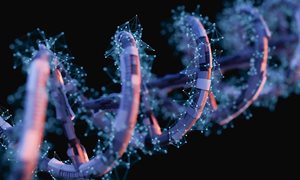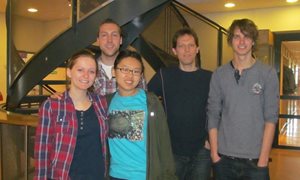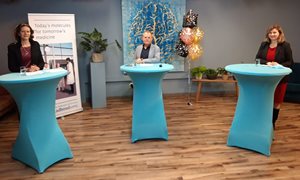
The board of the Dutch Research Council (NWO) Domain Science has approved sixteen proposals in the Science-KLEIN Open Competition.
The topics vary from research into the functions of proteins in the cell walls of the tuberculosis bacterium to research into the use of light to build fast computers. KLEIN grants are intended for innovative, high-quality, fundamental research and/or studies involving matters of scientific urgency.
Topic: Molecular mechanisms of actin isoform usage in cancer cell migration
Koen van den Dries, theme Nanomedicine
Metastases occur when cancer cells move from the original tumour to another tissue. Although we know that metastases are caused by the mobility of cancer cells, ways to prevent metastases are limited. More knowledge is therefore needed about the means by which cancer cells move. The movement of cancer cells is regulated by their skeletons and this project will investigate the role small differences in the building blocks of this skeleton play in the movement of cancer cells. We expect better definition of these differences to lead to more options for preventing metastases in the future.
Topic: Synthetic affinity-based probes for proteome-wide identification of poly(ADP-ribosyl)-binding proteins
Michiel Vermeulen, theme Cancer development and immune defence (RIMLS-faculty of science) and Dmitri Filippov (Leiden University)
Adenosine diphosphate ribosylation is a common post-translational protein modification that is involved in various pathological processes such as cancer, age-related diseases and viral infections. It is important that we know what proteins can interact with adenosine diphosphate ribose chains if we are to design better medicines. In this study, different molecules that contain adenosine diphosphate ribose will be synthesized and subsequently used for interaction tests in extracts from human cells. Follow-up tests will also be carried out to identify proteins that bind with adenosine diphosphate ribose and that play a role in the cellular response to damage to DNA.
Related news items

Rubicon grants awarded to three RIMLS researchers
19 April 2022Three researchers have received Rubicon funding from NWO/ZonMw. This will enable Elke Muntjewerff, Laura de Vries and Laurens van de Wiel to do research at a foreign research institute for the next two years.
go to page
ERC Proof of Concept Grant for Martijn Verdoes
8 March 2022 Martijn Verdoes, group leader Chemical Immunology at the department of Tumor Immunology, has been awarded an ERC Proof of Concept (PoC) Grant. The ERC PoC Grants are designed to support ERC grantees with the commercial or societal application of the results of their funded research. go to page
New genetic defect links cell biology and protein glycosylation
10 November 2021 Peter Linders, Dirk Lefeber and Geert van den Bogaart together with international colleagues have recently reported on novel cell biological insights, by identifying a genetic disorder in syntaxin-5 which allowed to unravel a new mechanism regulating intracellular transportation. go to page
RIMLS awards call for nominations
19 October 2021 RIMLS awards several prizes to stimulate and honor our (young) researchers. Upcoming awards are Supervisor of the Year, Best Master Thesis, Best Publication, Best Image and more. Send your nominations now before 24 November 2021. go to page
Miniaturized microfluidic platform for automated epigenetic profiling
6 May 2021 Together with Fluidigm, a US-based company focusing on microfluidics, the team of Hendrik Marks publishes in Genome Research the development of a powerful plug and play ChIP-seq platform for minute amount of cells, such as embryonic specimens or small biopsies. go to page
RIMLS online award ceremony proudly presenting the winners
13 January 2021In this special webinar of the RIMLS New Year Celebration, scientific director René Bindels reviewed 2020 and looked forward to 2021. But more importantly a number of researchers received prizes in the traditional RIMLS awards ceremony.
go to page
